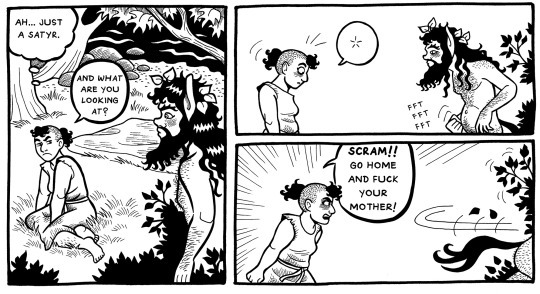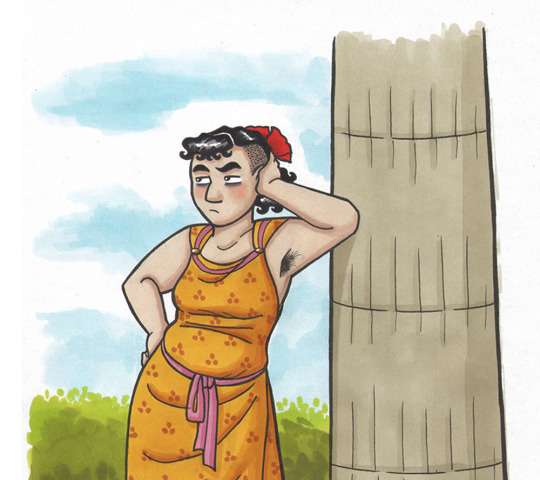Rachel Alexander's Blog, page 296
January 18, 2019
viajoenmoto:
Persephone selfie
The Good Counselor Chapter One: The Unseen One and The Apollonian
Metras’ weekly review of @therkalexander‘s previews of her latest novel, The Good Counselor.
[Spoilers ahead]
We are introduced to the son of Apollo and all of his musical glory, bathing and ridding himself of his gross mortal man-stink. Can we just give our dear author a high five for the details and well-articulated accuracy incorporated into every nook and cranny of her work? Rachel continues to focus so well upon every aspect of her writing that it’s almost impossible not to feel as if you were standing right next to the young man, listening to him sing with the birds and douse himself in olive oil (only the finest EVOO this side of the Aegean, kids).
Nevertheless, I doubt that the choice of introducing us to Orpheus through his human routines was quite deliberate. My curiosities surrounding Orpheus continue to grow. What could this Hellenic Snow White do that would sway Ananke? In the prologue, he is shrouded in mystery, talked of in secrecy and in hushed tones, told only through tales of invoking the birth of gods. I expected a well-adorned, confident follower of the Chthonic deities, glowing with the surety of the son of both a muse and a god.
Instead, we find…just a man. A musical man, who carefully crafts his tunes from the world around him, of course, but…just a man. At first, this seems to work against a preconceived notion about Orpheus and his renowned charm and power. He’s even dressed plainly in cloth that isn’t even dyed. Correct me if i’m wrong, but don’t most followers of any certain god or gods dress in accordance to their beliefs, adorning themselves in the image of their god(s)? Well, it would be for naught either way, because despite his upbringing in the care of Eumolpus and the shadow of Karpophoros, he states that his allegiance isn’t specifically to any one god (not even the ones he was raised to praise or even his alleged father).
It’s interesting to also note the way Orpheus seems to interact with his worship of Persephone especially. The epithet that he has chosen to refer to Persephone by is Karpophoros, which makes complete sense as even in DoL, the mortals of Eleusis – wherein it can be assumed that Orpheus spent most of his life – referred to her as such for her role in the bringing of blossoms and fruit. Superstition seems to dictate that most gods be referred to by their greatest epithets, so as to not offend them by calling upon them directly. However, our mysterious musician seems to make a slip of the tongue and calls upon Persephone by name, which is something he seems to not be used to. This is…odd for a man who has been reputed to call upon the birth of gods, and the founder of the lower Mysteries. It makes me think that maybe he is…afraid of Persephone, in some capacity. Why is that?
Well, Persephone of course does translate into “destroyer of light”, enacts curses upon man, and is also known as Praxidike, goddess of vengeance. Even without the reaffirmation of superstitious thought from Orpheus’ perspective, it’s pretty clear to see that Persephone isn’t exactly the sort of god you would want to call upon by name. It goes without saying that, in her winter countenance, she is to be as feared as she is respected.
Enter the invisible god! Hades- oops, sorry, the god of Nysa (way to be subtle, Aidon) demands an exchange of sorts with the hymnist. The price of loyalty and silence would be exchanged for the infamous harp that Orpheus would later use to charm the world, rocks and all. But the promise of such a lyre requires Orpheus to relinquish his morals to ensure the secrecy of the rites’ performance. Nevertheless, an agreement is reached, and business is a go.
I absolutely loved the foreshadowing of the line “But you yearn for something nonetheless. Something only one of my kind can procure for you.” Holla at ya girl, Eurydice. Of course, they’re only talking about the lyre right now. Of course, juuuust the lyre…for now. (Also, quick side note, I loved the usage of the word hemitheoi instead of demigod, because I don’t think I can look at that goddamn word the same way anymore since reading Percy Jackson).
I think, if I had to pick a favorite part of this chapter, it would have to be the moment where Orpheus names Zagreus and Aidon seems to get super excited on the down low, because he’s super collected but even Orpheus feels his emotions wash over him, and i’m sure Aidon’s thinking like “holy shit i’m gonna have my baby boy”. Only I doubt that everything will go exactly to plan. After all, the fates have had no cares for Aidoneus’ plans before…
As always, i’m excited for the next chapter, and will continue to write my review essays as each installment is uploaded. Feel free to add your own thoughts to this, as I love to open up a forum of discussion!
The Good Counselor is the continuation of Rachel Alexander’s Hades and Persephone series, and follows her first two publications: Receiver of Many and Destroyer of Light. You can catch weekly chapter previews up to the eighth chapter every Wednesday at midnight PST. Follow @therkalexander for more details!
My version of Persephone

Some time ago a Swedish comics blog reviewed my book Ljusförgörerskan (Destroyer of Light), giving it 5/5. I loved how they described my version of Persephone as “a curvy fertility goddess with hairy legs who loves nature but at the same time is introverted, sometimes quite unsympathetic, and most of the time very foul-mouthed”. It got me thinking, though. Another review described her character as “not always easy to like”. And it’s not that I don’t agree with them, I deliberately wrote her to NOT be a sweet little cinnamon roll (not that there’s anything wrong with being a sweet cinnamon roll, I’m just more fond of “darker” interpretations of Persephone).
What I found a bit funny was that no one has called my version of Hades unsympathetic or not easy to like, despite the fact that he too is cranky, introverted and sometimes quite rude (even if he’s not quite as foul-mouthed as Persephone). Is it because we get to see Hades’ devotion to his work and the dead, while Persephone’s goal in life mostly just seems to be to grow plants, take care of her pet snakes, and be able to have sex once in a while without getting pregnant? Maybe I have portrayed her as slightly more unsympathetic at times. Or is it that we are more used to see male characters behave like this, so we are more forgiving towards them? I think it might be a bit of both.
One of my motivations for portraying Persephone the way I did, was actually that I very seldom saw female protagonists portrayed like that (not to mention female protagonists with hairy legs and armpits).

Psst how long until we see new sexy times?

Attention: The sexy times featuring a pomegranate scene will be included in the preview. That is all.
(But only on AO3 and Literotica because I won’t violate ToS on the other sites post FOSTA-SESTA.)
metras:
cthonisprincess:
metras:
The Good Counselor Prologue: The passage of time, themes of death...
The Good Counselor Prologue: The passage of time, themes of death and life, and what in the world is Orpheus up to?[Spoilers ahead]
I couldn’t fathom a better introduction to the new book. The passage of time expressed really highlights the ever-present themes of life, death, and the cycle it follows which, at its core, is the purveyed concept of the series. Of course, our main pairing have remained untouched by time and have retained their godly figures, foreboding as they may be to some.
One thing I found interesting was the inclusion of mint in the incense of a dying man’s home. Of course, the usage of mint in death is hardly a strange concept in Hellenic mythos, but it goes to show more in the context of time, and how the scandalous indiscretions of Minthe have been transformed socially in just a handful of decades. It can be assumed that by knowing the origin of the plant, the inclusion of it in the vicinity of death proves how cemented Persephone’s actions and prowess are in the eyes of Plutonion acolytes. The acceptance and veneration of Persephone’s power is very present even from the first. Regardless of its intended meaning, good riddance to Minthe and all of her bullshit trifling. There’s a reason why mint tastes bitter, after all…
The respect shown by the students and family of Eumolpus towards Persephone and Hades is tangible. She isn’t questioned even once by those present in Eumolpus’ humble abode. They clear away for her, allow her to present herself in the face of death, and give her a moment with her dearest and dying Chthonic priest. I found this notable due to the fact that the acolytes and family of Eumolpus would understand the continuation of one’s soul shade in life, and while their own earthly bodies are losing their venerable patriarch, as it were, Persephone is forever gaining the presence of Eumolpus in Elysion. Surely, they would want to cherish every second they could alone with him, if they didn’t respect and love Persephone so much.
And it’s clear to see that the efforts posed by Persephone in clearing the name of Hades and clarifying the processes of Chthonia within the mortal realm were hardly for naught. The respect they are garnering is the right type of respect — one which is not born of fear or anguish, but rather hope for continuation and the promise of rebirth.
Which is why it’s important to note the passage of time here. When Hades — in all of his epithetic glory — appears, he is met with a far more fearful response. While the indiscretions of Minthe can easily be settled with a handful of decades, the engrained respect of Aidoneus remains timid and unsure, even with his own followers. 70 years is hardly enough time to forget the fright of death’s greatest lord appearing within one’s threshold. Sure, Aidon does not carry the Scythe that castrated Ouranous himself, but the power he holds over even the chilling concept of death is far greater than the desire to see him as one would see any other Olympian.
I’ve always wondered when and how the scrolls would come into play, ever since the vision of them appeared to Aidon and Persephone in their Hieros Gamos. It’s the one piece of the puzzle I haven’t quite managed to fit into the larger picture. Finding that the gold-foil scrolls are tied to Orpheus really intrigued me. What in the world could be his purpose for including them in the mouths of the dead? Does he wish to escort more souls into Elysion by claiming the souls as being born of the heavens? And to drink from the mnemosyne…does he wish to surpass the required drink of the Lethe? Is Orpheus’ main goal to best the processes of Chthonia and death?
This is my theory. This purpose feels like an expansion of his goals in traditional mythos — specifically in his quest to retrieve Euridice’s shade from Asphodel. But while we can assume that Orpheus would aid Hades and Persephone in their efforts to successfully conceive, would this make him something of an antagonist? After all, Sisyphus also tried to defeat the circle of life and garner powers of the heavens, too, and we know how well that went…
Perhaps Orpheus’ intentions are good, and he only wishes for people to remember their lives as they are escorted into death. That would explain why the scrolls contain directions to allow the soul to drink from the waters of the Mnemosyne, counteracting the forgetful spell of the Lethe. Yet I can’t help but feel as though this would be a betrayal of Eumolpus, Persephone, and Aidoneus altogether. Why else would the death of a venerable follower be so eloquently included as the prologue to this novel? Attempting to circumvent the very fundamental nature of life and death is very much against the interests of Chthonia, its rulers, and its acolytes.
I can’t wait for next week, and I wish Wednesday would come faster! This was a fantastic read, and I eagerly await the next installment.
This is a really intriguing dissection of the Prologue of The Good Counselor and considering that the Orphic Hymns were said to have been written by Orpheus himself, the possibility of Orpheus coming to feel antagonism towards the Chthonic deities is an interesting possibility.
After all, the Orphics believed that Zeus and Hades were the same deity and portrayed them as a dual-deity, identifying Zeus and Hades as being two representations of the same god and extended divine power, hence Melinoë and Zagreus’ bizarre mythic backgrounds. Perhaps this dual-deity merge was a deliberate act on the part of a spiteful Orpheus…
Very true! And if you add that in Receiver of Many, Zeus swore to claim their firstborn son as his heir, that only adds to the Zeus/Hades duality conflict that may appear as a result of the hymns and prose. It looks as if there might be a lot more Olympic intervention focused on politics in this installment.
January 17, 2019
Hello! I saw you answer somebody's ask with "don't start at the start". I think I'm doing this (it's my new favorite way of writing) but how do you stitch everything together and make sure it not only works together but details are constant?
An extremely. Careful. Read through. With other eyes on it too. And even then I caught a few inconsistencies that went to print.
This may just be me being a huge sucker for HEAs, but I just really want P & H to hold a little baby in their arms.
You may get your wish. But not without the usual torturous twists and turns. ;)
The Good Counselor
Free previews published weekly every Wednesday night at Midnight, Pacific Standard Time.
Seventy years have passed since Elysion was created, and Persephone’s efforts to conceive a child with Hades have been in vain. But a secret rite on Samothrace might bend the Fates and give them all that they have ever dreamed of, or pave a path of untold suffering.
Chapter 1
The water was calm, clear and infused with the scent of ash. He knelt down and washed his arms, his legs and torso. It was cold and purifying. He rubbed olive oil across his skin, banishing all miasma from his person.
Orpheus scraped the excess oil off with a metal strigil and dried himself in the sunlight, tussling his short brown hair to shake out the water. He donned his tunic and himation, both unadorned and undyed.
He closed his eyes, trying to escape the distraction of his surroundings, listening. A songbird in the oak tree warbled its tune and he hummed along with it. A song to the Seasons had overtaken his thoughts for the last several days, but still the tune for the heart of the hymn eluded him. He had no instrument to produce a harmony— none, at least, that could do the immortals justice. He borrowed the bird’s notes, slowing them to match the words. “At play you are companions,” he sang softly.





